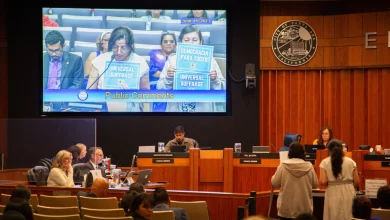On March 26, Bernie Sanders won a landslide 73 percent victory in the Washington State caucuses. Sanders also took the Alaska and Hawaii caucuses with strong margins.
The caucus process is emblematic of the undemocratic nature of the election system in the United States. While seemingly a quaint ritual of participatory democracy, the caucus system excludes and disenfranchises many.
Nonetheless, Sanders supporters organized very well and brought out the vote, leading to a strong showing in almost every precinct and winning every county.
Washington State caucuses
The presidential caucus in Washington State is a Democratic Party-only affair. The Republicans have their own primary in May. So-called minor parties have a separate process for attaining ballot status with very different procedures and requirements. Participating in a caucus requires an individual to show up before 10 a.m. on a Saturday and stay for several hours until the second-round voting, when the precinct delegates to the Legislative District Caucus and County Conventions are chosen. If you are late to the caucus, you risk being shut out. If enough people leave after the first round of voting, the candidate who won fewer votes may end up getting the delegates despite not winning the first vote.
This is very confusing. On the Washington for Bernie Sanders Facebook page, organizers repeatedly explained these rules to the thousands of supporters who are new to the electoral political process.
Caucusing requires a high degree of commitment and involvement. People with small children, people with health challenges, weekend workers and some religious minorities may not be able to participate. For those unable to attend, the only option for participation is to submit a surrogate affidavit which is due a week before the caucus. The surrogate affidavit is a sort of ballot that is mailed to a Democratic Party state official. These are then sent to the precinct captains to be counted in the first round. Clearly, submitting a surrogate affidavit is not the equivalent of casting an absentee ballot in a regular election or primary, as the voter doesn’t get to participate in the second round of voting at the caucus.
Experiences during caucuses
Liberation News spoke to Sanders supporters whose experiences highlighted some of the issues of the caucus system. In one relatively atypical situation, a supporter shared that the turnout in their precinct was quite low, as they live in a predominantly Jewish neighborhood, with many very observant Jews, and the caucus took place on Saturday, the Jewish Sabbath. In that case, the precinct actually started out with a majority of first-round votes for Clinton, but as no Clinton supporters were willing to serve as delegates to the state convention, Sanders supporters ended up being the delegates.
As can be deduced from the results in general, turnout was at a record high. Sanders supporters made great sacrifices to be able to participate; some went wearing face masks due to being ill with flu; another borrowed a wheelchair because they were too ill to walk and stand. Many brought young children with them.
Liberation News spoke with a young fast-food worker (who wishes to remain nameless). They had been scheduled to work the morning of the caucus, but they and most of their co-workers decided to call in sick so they could caucus for Sanders.
Many Sanders supporters were bolstered in their enthusiasm for their candidate by a series of well-attended and well-publicized regional rallies, including the by now-famous #BirdieSanders rally in Portland on March 24 and a massive rally at Safeco Field in Seattle on the eve of the caucus. In addition, the Sanders victories in Utah and Idaho were also highly encouraging. Furthermore, Sanders supporters were angered by the apparent voter fraud and suppression that took place in Arizona, and many were determined to make the Washington turnout so overwhelming that there would be no question about who the winner was.
While there is some evidence of possible “dirty tricks” in the caucus process, including reports of mailings that included incorrect information, most online reports I have seen from participants indicate that precinct captains conducted the caucuses with integrity. Since Washington State caucuses are “open” you do not have to be registered in the Democratic Party to participate and you can register to vote the day of the caucus. I have also heard of a few instances of apparent Clinton operatives behaving in a dubious manner during a caucus, but these do not seem to represent the majority experience.
Are Sanders supporters being duped?
Some on the left paint Sanders’ supporters as dupes being misled by a “phony socialist” whose only intention is to drag them into the Democratic Party fold and hand their support to Hillary Clinton after she wins the nomination. However, the experience of this journalist would suggest otherwise. When asked about their understanding of the terms “socialism” and “political revolution,” a number #Berners had a solid Marxist understanding of the term, and clearly understood that Sanders is what used to be called a liberal, not a revolutionary socialist. While many espouse personal admiration for the Vermont senator, they are also drawn to the idea of being part of a mass movement to fight for real change in our society.
One outcome of the #BirdieSanders incident has been a series of bird-themed memes. One that speaks to the “dupe” question shows two sparrows with one  asking the other, “Did you seriously just ask me if I’d vote for Clinton if Bernie loses?” A spirit of “Bernie or Bust” pervades many of online discussions. At least among Washington Sanders supporters, it would seem that many see Hillary Clinton as being just as undesirable as any Republican.
asking the other, “Did you seriously just ask me if I’d vote for Clinton if Bernie loses?” A spirit of “Bernie or Bust” pervades many of online discussions. At least among Washington Sanders supporters, it would seem that many see Hillary Clinton as being just as undesirable as any Republican.
While they continue to put their energy and money into Sanders winning the Democratic nomination, conversations are ongoing about potential third-party candidates to support if Sanders fails to attain the nomination—or is robbed, as they see it, by the super-delegate system that exists to prevent grassroots candidates from winning against the wishes of the party machine. At present, the state’s super-delegates are all pledged to Hillary Clinton. This includes prominent Democrats like Gov. Jay Inslee and Senators Maria Cantwell and Patty Murray. Numerous petitions are circulating along with other social media campaigns to demand that the super-delegates from Washington respect the will of the voters and cast their support to Sanders.





